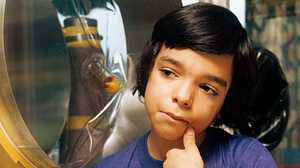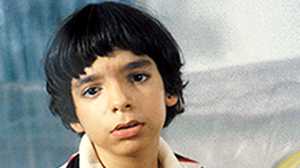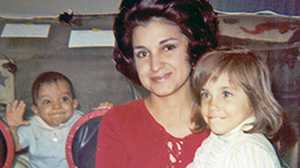David Vetter's Parents

Carol Ann Vetter Demaret and David J. Vetter Jr.'s first child was a healthy girl named Katherine, born in 1968. Two years later they had a second child, a son named David Joseph Vetter III. David Joseph was born with severe combined immunodeficiency (SCID), meaning his immune system did not work, making him extremely susceptible to any illness. Katherine's bone marrow appeared to be an acceptable match to her brother's, and a transfusion was made, but David Joseph died before it could take. He was seven months old.
Another Chance
A few weeks after David Joseph's death, the grieving Vetters were pregnant again. Doctors explained that if they had another boy, there was a fifty percent likelihood that he would also be afflicted with SCID. Amniocentesis determined that the fetus was indeed male, and the Vetters, devout Catholics, decided to proceed with the pregnancy, albeit with extraordinary measures prepared for the birth.
A Simple Choice
The Reverend Raymond Lawrence, director of Clinical Pastoral Education at Texas Children's Hospital at the time, later suggested that the Vetters "were encouraged to conceive and carry [the child] to term" by a medical culture that valued technological advances over the humanity of its patients. However, in a People magazine article after David's death (and published as Lawrence's article went to press), Carol Ann wrote:
"The decision to have another child came from our hearts and our minds. We were not trying to fill a void, to replace the son we had just lost. We decided to place our trust in God. No matter what happened, to us a therapeutic abortion would have been out of the question. Our choice was very simple: Have a child or not have a child."
More recently, she admitted to an interviewer, "our judgment perhaps was a little clouded by the grief that we were feeling at the time."

Born and Isolated
On September 21, 1971, David Phillip Vetter was born and immediately placed into an isolating, sterile plastic bubble.
Waiting for a Therapy
While the Vetters waited, David's doctors conducted tests to determine if David had SCID, and two weeks later the worst was confirmed. The best therapeutic option was a bone marrow transplant, but his sister Katherine, the most likely donor, was not a match. The only other, open-ended options were to wait for science to develop a cure for SCID or for David's immune system to develop spontaneously. This uncertain hope was based on the experience of a pair of twins, one more sickly, one robust, in similar circumstances, who did develop a level of T-cells approaching normal. They were released from their sterile environments, but their outcome provided little promise. In a matter of months, the sicklier twin died; the second twin, not long after, was killed in a car accident. The Vetters would wait 12 long years for a new therapy to be developed.
A Ray of Hope
By 1983, a new process of bone marrow transplantation had been developed which did not require an exact match. Katherine donated her marrow and David received the sample. Complications soon arose and it became necessary to remove David from the bubble for what would be the last two weeks of his life. Those last days were the first time his parents ever held him, and the first time he saw them without a sheet of plastic between them.
Extraordinary Efforts
Despite the circumstances of his care, David's parents worked hard to give him a loving, social and religious environment to grow up in. An isolator bubble was set up in the Vetters' Texas home and both parents were trained in the operation of all the equipment. The establishment of this second bubble meant that David could spend time away from the hospital and celebrate holidays at home.
Social Life
The Vetters invited David's schoolmates and neighbors' children into their home to play with David. His best friend Shawn even arranged for a local theater to screen Return of the Jedi; the Star Wars fan watched from within the transport bubble that was used to bring him from the hospital to home.
Religious Faith
His parents raised David in the Catholic church. He was baptized with sterile holy water by one of his doctors, Raphael Wilson, a lay brother of the church. For his First Communion, the Vetters' parish priest cooperated with the hospital to have the unconsecrated host irradiated as a sterilization procedure. Mass was celebrated in the Vetter home by the priest and occasionally by the bishop, as well.
Efforts at Privacy
Carol Ann and David Vetter requested privacy for their family and the media respected their wishes; it was not until a decade after their son's death that they revealed their last name to the public. Carol Ann recalled that when David first realized he was famous, he decided he didn't have to do his chores, telling her: "I don't have to clean up my room. I'm a star. I had my picture in the paper yesterday." Her response: "I told him I had checked the newspaper today and that his picture wasn't in it anymore, so he still had to do his chores. He laughed -- and cleaned up his room."
Special People
The plastic bubble and months spent at the hospital inevitably affected David's relationship with his parents. Dr. David Freedman, a psychiatrist who worked with David, described the boy's development at age three as precocious, but compared his relationship with his parents to children in an Israeli kibbutz, where children are raised communally: "He certainly identifies [his parents] as special people," but compared to other three-year-olds, David's attachment to his parents was "nowhere near as intense." At the time, Freedman reported, "he has no qualms whatever about coming back to the hospital." Just two years later, Carol Ann would remember David at home being upset about going back to the hospital.
Later Years
The years of caring for David understandably took their toll on the family. Following David's death in 1984, his parents divorced. Carol Ann's collaborator on her People article was the magazine's Houston bureau chief, Kent Demaret, who had followed the story from David's birth. In 1988 Carol Ann Vetter and Kent Demaret were wed. Today, David J. Vetter Jr. lives in Shenandoah, Texas -- in the same house where the isolator was set up for his son. He runs an accounting business and has been active in civic government, serving as mayor of his town from 1996 to 2005. Shenandoah has opened a museum in its City Hall and the life of David Phillip Vetter will be a featured exhibit.







